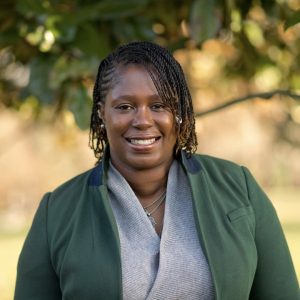 RMHF’s Voices from the Region continues with our recent interview with the Honorable Nicole Jones, a member of the Richmond City Council representing the 9th District.
RMHF’s Voices from the Region continues with our recent interview with the Honorable Nicole Jones, a member of the Richmond City Council representing the 9th District.
Jones was first elected to the Richmond City School Board in 2020. She was appointed to the City Council in December of 2023, and was subsequently elected to the same seat in 2024.
All Voices from the Region interviews begin with the same question: “How do you define health and racial/ethnic equity, and what does it look like in practice?”
Councilwoman Jones emphasizes that, in her view, health, ethnic, and racial equity is a larger issue; one that goes beyond ensuring access to healthcare, doctors, or hospitals. For Jones, health and racial/ethnic equity is more holistic.
“It encompasses affordable housing, healthy foods, and safe and clean neighborhoods where families can thrive,” she said. “At its core, health and racial/ethnic equity is about freedom; freedom to be well, to live with a sense of pride and dignity, and to pass these on to the next generation.”
When it comes to how she sees this play out within the 9th District, Jones spoke to the need for people in her position to be engaged with the community on a daily basis about daily issues.
“Whether it’s advocating for affordable housing, ensuring neighborhoods have sidewalks, green spaces, and reliable transportation,” she said, “My goal is to ensure that the residents of the 9th District can move freely, safely, and live well. It means equipping our young people with the tools they need to learn while supporting their mental and physical well being.”
As a sitting member of the Richmond City Council, Jones identified the two best ways to identify opportunities to support health, ethnic, and racial equity efforts: listening to the residents of the 9th District and following the numbers.
“I pay attention to what I’m hearing at my monthly town halls, community meetings, and in everyday casual conversations,” Jones said. “I also pay close attention to data. Things like high eviction rates or things affecting certain neighborhoods based on the zip code helps to identify inequities.”
Jones expanded on the necessity of listening and learning from her constituents, specifically mentioning the importance of forming and sustaining community relationships, and using her engagement with residents and her focus on data to identify opportunities to expand health and racial/ethnic equity.
“I stay in touch with the schools, nonprofits, health providers, grassroots groups, and businesses within the 9th District,” she said. “Adding all these together as a Council member, I am able to champion policies and resources focused on equity and well-being.”
However, even as Jones outlined her community-driven approach, she shared her candid assessment that one of the biggest challenges to expanding health, ethnic/racial equity, both in the 9th District and across the Richmond Region, is the uncomfortable reality that none of the systems she works within were ever designed with equity in mind.
“Making progress is harder than it should be,” Jones explained. “And serving a district with the largest Latino population in the City, I see so many of our families navigating language barriers, immigration concerns, lack of resources, and limited access to culturally competent services.”
Jones’ answer also explored some of the larger issues at play in her district. As she mentioned in her response, the 9th District has historically been disenfranchised, which results in a lack of resident engagement.
“For me, engagement is everything because some of the greatest solutions come from the people most affected,” she said. “These issues are both a challenge and a responsibility. I’ve been intentional about bringing translation services into our town halls, building relationships, and showing up consistently so that families know that their voices matter. This is the necessary work if we are truly serious about advancing equity.”
Jones mentioned the People’s Evolution Music Festival as a specific example of this kind of “intentional community engagement.” Created in collaboration with the city in 2024, Jones explained that the event not only welcomed 2000 residents to participate in the cultural life of the 9th District, but it elevated local artists and traditions, activated the community, and fostered a sense of belonging and connection.
Like many of the community leaders we’ve spoken with as a part of Voices from the Region, Jones was both heartened by the progress being made and honest about the remaining shortcomings.
“There has been progress with the opening of the Southside Community Center,” Jones said. “This major investment has given families a safe space to gather and access resources. As a community hub, the Center directly supports health and racial/ethnic equity.”
She also identified infrastructure investments in parks, sidewalks, transportation and other improvements that promote equity and directly impact the everyday lives of 9th District residents.
Meanwhile, Jones explained one glaring shortcoming that she would like to change immediately: how resources are distributed.
“The 9th District tends to get what’s leftover instead of what’s needed, and that approach has got to come to an end,” Jones remarked. “I’m advocating for more targeted investments to fully fund a variety of much-needed community improvements.”
Ultimately, Jones was adamant that in order to truly accomplish health and racial/ethnic equity goals, it will take two things above all others: trust and a shared commitment.
“In communities like the 9th District where people have felt left out, building trust has to be the foundation if you want to see real progress,” she asserted. “I would also say that true equity cannot be accomplished in silos. It takes everyone moving in the same direction. The path forward requires persistence and collaboration until equity isn’t something we are striving for, but instead the standard that defines the 9th District and beyond.”